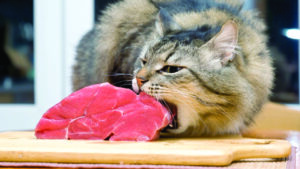By Dr. Beth Leermakers
Nutrition is linked to our pets’ health and wellbeing. A cat’s diet directly affects several illnesses, including obesity, pancreatitis, feline lower urinary tract disease, heart disease and diabetes. Feeding too much low-quality protein can worsen a cat’s kidney disease symptoms.

Photo courtesy of Perfect Love
Despite its importance, many people don’t pay attention to the nutritional quality of their pet food. While I was at the Fort Worth shelter picking up a weekend foster dog, I talked an adopter out of taking a big bag of a poor-quality, widely advertised dog food. I suggested a smaller bag of a higher-quality kibble instead. I often recommend people consult dogfoodadvisor.com to choose a nutritious dog food. Unfortunately, catfoodadvisor.com is still under construction, and I haven’t found a similarly unbiased source for cat food reviews.
Cats’ nutritional needs differ from dogs’ and people’s. The Association of American Feed Control Officials (AAFCO)’s statement of nutritional adequacy can help you choose a cat food that has all the essential nutrients. Look for something along these lines on the package: “Animal feeding tests using AAFCO procedures substantiate that World’s Best Cat Chow provides complete and balanced nutrition for adult maintenance, growth and reproduction, or all life stages” or “World’s Best Cat Chow is formulated to meet the nutritional levels established by the AAFCO Cat Food Nutrient Profiles for adult maintenance, growth and reproduction, or all life stages.”
Cat parents should consider these six essential nutrients when choosing cat food:
Animal protein. Cats are carnivores, and they need to eat more protein than many other animals. Dietary protein is essential for building and maintaining muscle, skin, fur, nails, tendons, ligaments, cartilage, enzymes, hormones, antibodies and more. Protein is also an important energy source for cats. Cats need animal protein (meat) because it contains the 11 essential amino acids, which are the building blocks for protein.
Look for high-quality animal protein (identifiable muscle meat or organ parts) at the top of the ingredients list — chicken, lamb, rabbit, turkey, pig’s heart, pig’s liver, etc. — instead of meat meal or by-products. Studies have shown that muscle meats and organs are highly digestible forms of protein for cats, with digestibility ratings of 92 percent and 90 percent, respectively. Corn (an inexpensive filler) has a much lower digestibility rating (54 percent). Proteins can trigger food allergies in cats. If your cat has allergy symptoms, ask your vet what food would be best.
To be nutritionally complete and balanced, cat food needs to contain at least 26 percent crude protein on a dry matter basis. When it comes to protein, more is usually better — if it’s high-quality. Crude protein is an estimate of a diet’s protein level (determined by measuring the amount of nitrogen present). Check the Guaranteed Analysis section on the food label.
Determining the “dry matter basis” requires doing some math: Find the percent moisture in the guaranteed analysis and subtract that number from 100 to get the percent dry matter for the food. Then divide the crude protein percentage by the percent dry matter and multiply by 100 to determine the crude protein percentage on a dry matter basis.
Fat. Fat is the most energy-rich nutrient in a cat’s diet. Fats help conduct nerve impulses and are critical for skin and coat health, inflammation and wound healing. Your cat’s food should have at least 9 percent fat on a dry matter basis.
Carbohydrates. Carbs are important energy sources for people (think “carbo loading” before a marathon) and many animals, but they’re less important for cats, who get most of their energy from protein and fat. Carbohydrates should make up only a small amount of your kitty’s food. Cats should get less than 10 percent of their calories from carbs. Dry food needs carbohydrates to maintain its form, so kibble will have more than 10 percent carbs. To limit carbs, you have to feed canned food.
Vitamins. Small amounts of vitamins are necessary for feline metabolism. Vitamins occur naturally in cat food ingredients — meat, fruit, vegetables, oil — but must be supplemented during the manufacturing process to meet recommended levels. According to AAFCO, cats need these 13 vitamins: Vitamins A, B12, D, E, and K, thiamine, riboflavin, niacin, pantothenic acid, pyridoxine, folic acid, biotin and choline. If your cat is healthy and eating a well-balance type of cat food, she doesn’t need to take vitamin supplements.
Minerals. Your cat needs these 12 minerals for normal body functioning: calcium, phosphorous, potassium, sodium, chloride, magnesium, iron, copper, manganese, zinc, iodine and selenium. Again, if your cat is healthy and eating a food that has the AAFCO statement of nutritional adequacy, you don’t need to give your cat supplements.
Water. I saved the most important nutrient for last. Water makes up 67 percent of a cat’s body and is essential for virtually all metabolic functions. Healthy cats need 4-5 ounces of water per day per 5 lbs. of body weight (including water from their food). If your cat eats canned food, he won’t need to drink as much water.
Should you make your own cat food? While it may be tempting to prepare homemade food so you know exactly what Fluffy is eating, experts advise against doing so. The safest and simplest way to meet your cat’s nutritional needs is to feed her a high-quality, AAFCO-approved canned cat food.
If you do cook for your cat, don’t follow recipes you get online. They probably won’t be nutritionally complete and balanced. Instead, use vet-approved recipes designed for your cat by a board-certified veterinary nutritionist who will consider your cat’s age, weight and health problems. Your veterinarian may be able to recommend a veterinary nutritionist, or you can locate one through the American College of Veterinary Medicine. Or use an online service such as Petdiets.com and BalanceIt.com, run by veterinary nutritionists.
Choosing a nutritious cat food is worth the time and energy. And it’s sure easier than brushing your kitty’s teeth!
